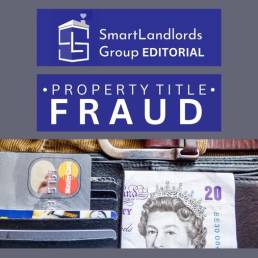Title Fraud and How To Avoid It – SmartLandlords Group, 30 October 2022
Property Title Fraud
It’s when criminals gain illegal transfer of a property into their name after stealing the owner’s identity or by using false documents. By fraudulently updating HM Land Registry details, they then go on to sell or raise a mortgage against the property, often deceiving solicitors and other parties involved in the process. This differs from Conveyancing Fraud and Rental Fraud.
A title is the legal way of saying you own a right to something. For real estate purposes, title refers to ownership of the property, meaning that you have the rights to use that property. It may be a partial interest in the property or it may be the full.
Property Title Fraud is on the increase a situation that many may be unaware of and yet, following media reports of a homeowner who discovered that their property had been sold and a new owner had moved in to it, without their knowledge, perhaps it’s something that homeowners should pay more attention to.
Here is one woman’s tale, which shows what can happen and just how easy it is for criminals to perpetuate this type of fraud.
“Returning home from a three-week absence, Surrey resident Angela Ellis-Jones was horrified to find she was no longer her house’s registered owner – and faced a four-month fight to get the property back.
In an attempted heist of breathtaking audacity, a woman apparently named Catherine Agnes Walder nearly succeeded in stealing an actual house. While the real owner Angela Ellis-Jones was away on a three-week visit to her mother, the fraudster contacted the Land Registry (posing as Angela) to transfer ownership of the property into her own name. She even used a solicitor.
Angela had bought the South London detached house in 2002 for £345,000. Now mortgage-free, its market value had risen since to around £850,000. The fraudster first stole her identity by intercepting her mail, by the simple process of taping up the house’s letterbox and affixing a fake letterbox to the front door. Angela reporting this act to the police, but no action was taken. Two months later, she received notification from the Land Registry that her house was no longer in her name.
The fraudster was able to pay the £80 transfer fee anonymously by using a postal order, which the Land Registry still accepts. Angela now faced a bureaucratic battle to recover legal ownership of her home; she recalls, ‘At times it felt like the law was on the criminal’s side.’ The Land Registry said it treated the crime as a ‘civil matter’ rather than fraud, and – incredibly – told Angela that the ‘current registered proprietor’ would need to give permission for Angela’s name to be put back on the register. In other words, they needed to ask the thief nicely if she minded returning Angela’s property.
The dispute dragged on for over four months, during which time Angela says she feared for her safety. ‘With a house worth this much, what lengths would they go to get me out of the way?’ At the time she had no way of knowing whether the fraud really was the work of a single individual, or of a highly organised and resourceful criminal gang.
Fortunately, the fraudster proved to have bitten off more than she could chew, since she raised no objection to the house being transferred back to Angela. However, the ease with which the initial theft was achieved highlights some worrying weaknesses in the Land Registry system, such as the ability to pay anonymously and inadequate checks on the apparent owner’s identity.
Crimes of this kind are known as property title fraud, and Angela’s case is far from unique. In the year to April 2017 this type of fraud accounted for some £24.9 million worth of property misappropriated by various means. The amount has more than trebled in the space of five years – partly due to rising property prices, but also due to better technologies being available to criminals. Scams target both sellers and buyers, and will often involve false sales by those claiming to be owners. Scammers may also rent properties to intercept post and pretend to be the real owners. Buyers and sellers can be particularly vulnerable during the closing days of a sale – for instance, solicitor emails may be hacked and money transfers may be redirected to fraudsters’ accounts.
If a fraudster manages to transfer a property into their own name and refuses to transfer it back, the case must be resolved by the Lands Tribunal, which can be a long and expensive process. A spokesperson for the Land Registry said, ‘HM Land Registry is doing all it can to minimise the risk of property fraud. Since 2009, HM Land Registry has prevented 279 fraudulent applications, representing properties valued in excess of £133,431,543. If someone is defrauded of their registered property, our state indemnity means they will usually be compensated for any resulting loss.’” Quoted from a recent news article.
The risk of Title Fraud
Is surprisingly easy as the above experience shows. Any homeowner can be at risk although there are some properties that are deemed more susceptible to fraud. These include properties that are:
– Empty for some period of time, such as some rental properties or holiday lets
– Properties that are uninhabited, perhaps because the owner is living overseas
– Properties that are not currently registered with HM Land Registry.
These could be properties owned before 1990 and where no mortgage has been taken out on the property since that time. The government has a website here where you can check if, and to who the property is registered.
What can be done to prevent Property Title Fraud
• Remain vigilant to potential identify theft. Action Fraud, (the UK’s national reporting centre for fraud and cyber-crime) provides advice on this.
Action Fraud collects and collates data on fraud crime and passes it on to these organisations. The NFIB and City of London Police use this intelligence to tackle fraud crimes committed against both consumers and business. The National Fraud Intelligence Bureau (NFIB) sits alongside Action Fraud within the City of London Police which is the National policing lead for economic crime. https://www.actionfraud.police.uk/
What action should every property owner do now
• Set up a property alert via HM Land Registry. This ensures that whenever a search or application relating to the property is made, the homeowner (or perhaps a concerned relative) will be notified. Up to 10 properties can be monitored (per email address) so it might be useful for landlords who have a portfolio of properties. To set up an alert access the HM Land Registry website.
• Place a financial restriction on the property to avoid it being registered for sale, or mortgaged without the owner being consulted. This can be arranged via application to the HM Land Registry, although you may need to gain support from a solicitor. Further information is available via the government website: https://www.gov.uk/…/practice-guide-29-registration-of…
• Once the property is debt free (first charge) make sure that you have the original deed in your possession, stored securely.
Know what is the difference is between a title and a deed. A deed is evidence of a specific event of transferring the title of the property from one person to another, a person in legal terms is also a corporation. A title is the legal right to use and modify the property how you see fit, or transfer interest or any portion that you own to others via a deed. A deed represents the right of the owner to claim the property.
Hopefully this will avoid your property being subjected to this type of fraud and the expensive litigation to recover it.
SmartLandlords Copyright 2018-2022
30 October 2022

